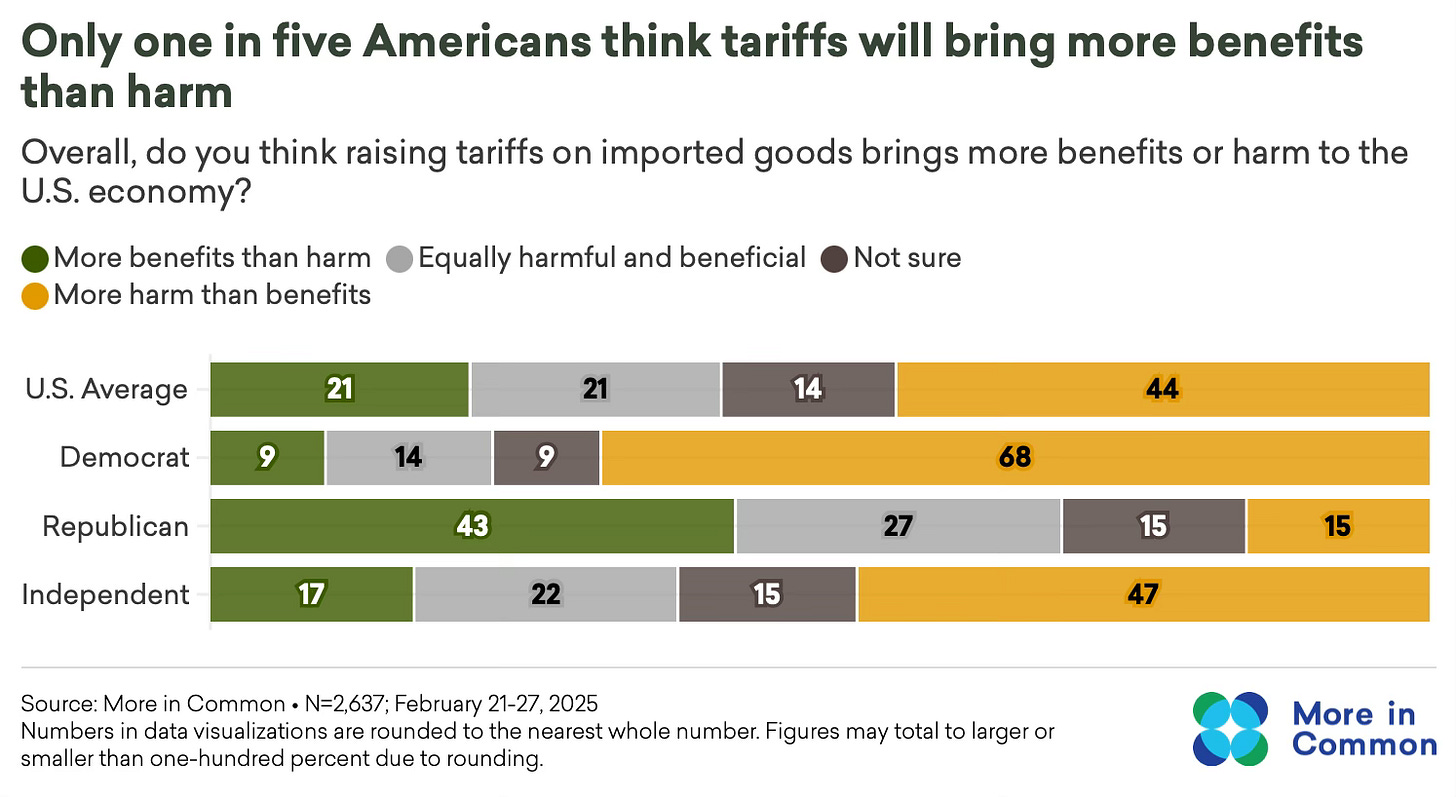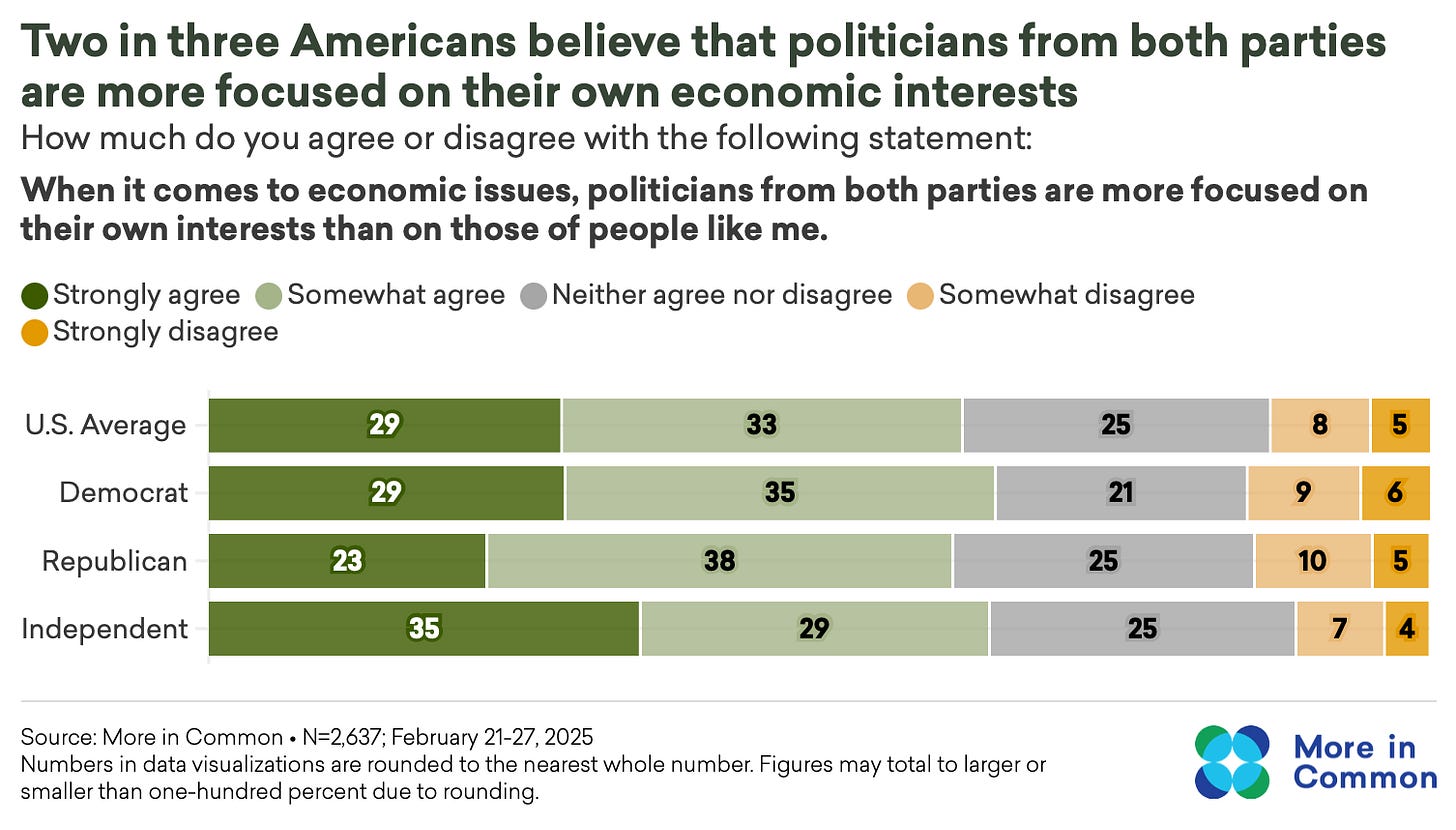Jay's Notes: Trump’s tried and true political strategy will fail him on tariffs
Summary: Jay’s Notes is a weekly (ish) space where our Executive Director, Jason Mangone, can sling his takes. Today, we released new data on how Americans are feeling about President Trump’s proposed tariffs. You can download our cross tabs and read about it here.
President Trump is wildly entertaining. As the first true populist to lead the country in our lifetimes, his performative style isn’t just a sideshow. It’s an essential feature of his politics, and what propelled his unlikely rise to the top of American politics, a perch he’s remained atop for a decade now.
If Trump’s showmanship is foundational to his politics, it also lends itself to his particular style of governance. He leverages his celebrity to make forceful proclamations about where he stands, clarifying who he’s with and who he’s against, and especially now in his second term, he moves hard and fast to do as much as possible out of the executive branch.
This can be a very effective strategy, especially when he claims positions and takes actions that are, in fact, popular with large majorities of the country. And when he takes positions that are a break with a seemingly-stifling elite consensus, it redounds to his and Republicans’ political benefit. Most Americans don’t want transgender women playing in girls sports. Most Americans want a secure border. Trump has delivered on those issues, and in so doing has been able to paint Democrats as out-of-touch, ineffective, and slow to act.
President Trump is running a version of the same playbook on tariffs—a key plank of his economic agenda. Every month since he’s taken office, he’s engaged in highly-publicized economic brinkmanship with Mexico and Canada. It looks like these monthly fights have been undercards for the Main Event. April 2nd is Liberation Day, when, according to the President, “we’re going to be getting back a lot of the wealth that we so foolishly gave up to other countries, including friend and foe.”
Whether you like Trump’s style or not, it’s very effective when he’s taking popular positions. Given where Americans stand on tariffs, Trump’s pick-a-fight-and-move-fast strategy won’t work. If he wants to leverage tariffs to secure a new American economy, he’ll need to use his bully pulpit to paint a constructive vision of what that new economy might look like.
So what do Americans think?
New research from More in Common found that 44% of Americans, including a majority (68%) of Democrats and a plurality (47%) of Independents, think that tariffs will bring more harm than benefits to the economy. Only one in five Americans think that tariffs will bring more benefits than harm, including a plurality of Republicans (43%).
Depending on where you sit, you could read this as general skepticism or tepid support for tariffs. That’s not terribly surprising: tariffs hit American wallets and pocketbooks in the short-term–and according to our polling, Americans’ primary economic concern is prices. When asked to choose which three economic issues they’re most concerned with, 62% of respondents in our poll, (including 57% of Democrats and 65% of Republicans) listed “the prices of everyday goods” (e.g. groceries, gas)—more than doubling the concern for anything else.
Moreover, there’s well-founded cynicism about whether or not our political leadership cares about the economic interests of its voters at all. A majority of Americans from all political backgrounds agree that “when it comes to economic issues, politicians from both parties are more focused on their own interests than on those of people like me.”
Within Trump’s base
Among his own base, though, Trump is in a position to weather any storm—at least for now. 82% of Trump voters believe that the Trump administration will work in favor of the interests of people like them. Our focus groups accentuate this point. Amanda, a 40-year-old from Central Pennsylvania and a moderate Republican said, “In the immediate term (tariffs) cause some economic hardship, but in the long term it can benefit American jobs, and depending on what tariffs are being leveraged for, it can improve the economy.”
It's a testament to President Trump’s political skill that his base seems open to enduring short-term pain for some longer-term benefit. But unlike other issue areas, his economic agenda is met with more skepticism outside of his base. Only 29% of Independents think that, when it comes to economic policy, the Trump administration will “work in favor of the interests of people like me,” compared to 51% of Independents who think that the administration will “Work against the interests of people like me.”
Rachael, a 38-year-old Independent from Vermont who voted for Trump in the last election was skeptical about tariffs: “Time shall tell. Trump thinks it will eventually be better for the US, I guess we shall see how it goes.”
While I wish it weren’t the case, the truth is that cynicism is politically effective—or at least politically expedient. It’s easier to explain what you want to destroy than to describe what you want to build. And indeed, there is strategic logic in just coming out of the gates hard, fast, and unpredictably. While it is a strategy that pits Americans against one another, it also maximizes short-term efficiency, and is especially effective for rolling back and tearing down.
Mr. Trump’s conviction about tariffs is a core feature of his politics and his worldview, rooted in his sense that “America is getting ripped off.” He’s consistently called for tariffs since at least the 1980’s. One way to level the playing field is to make everyone worse off. Americans indeed want a better deal out of the global economy, but only a deal that leads to a thriving working class. Rolling back free trade and tearing down the old economy won’t sustain support for the President's tariff program–he’ll need to use his rhetoric to orient the country around the new economy he wants to build.
The best-faith arguments for tariffs acknowledge short-term tradeoffs, and point toward a future economy that is more fair for American workers and secures American global leadership by ensuring that we have control of our supply chains.
But this vision will take some time to build. And how much are Americans really willing to endure? We’re already desperate to get our hands on affordable eggs, tracking the price of household goods, and all signs point to prices increasing for everything from cars to groceries.
Trump’s gambit
To echo Henry Olsen, a senior fellow at the Ethics and Public Policy Center, “The global trading system wasn’t built overnight, and it will not be reoriented overnight either. It takes years to build new factories or find new markets for existing goods.” Many of the President’s surrogates are grasping at this sort of constructive argument, that explains why the short-term pain of tariffs will be worth the long-term gain in productivity, what members of Mr. Trump’s cabinet have taken to calling a “detox.”
Last week, the Vice President even devoted an entire speech meant to synthesize the competing interests of the populist right and the tech right. In that speech, he said, “We believe that tariffs are a necessary tool to protect our jobs and our industries from other countries, as well as the labor value of our workers in a globalized market. In fact, combined with the right technology, they allow us to bring jobs back to the United States of America and create the jobs of the future.”
But when Mr. Trump is taking center-stage, anything his surrogates say–even those as prominent as the Vice President of the United States–will receive almost no attention from the average voter. Mr. Vance may have made a good-faith attempt to paint a constructive vision of the future economy that one can agree with or not. But most Americans see tariffs through the lens of the President’s ongoing fights with Canada and Mexico. And it looks like the President is using “Liberation Day” to spoil for an even bigger fight.
While President Trump’s showmanship has proven politically effective, he is overestimating the degree to which Americans—including his own supporters—organize their lives around hating other countries and other Americans (namely, Democrats). President Trump claims to want to usher America into its next golden age. If so, on issues like tariffs that take time to pay off and where swing voters are skeptical, he’ll need to start talking more about the future he wants to build, and less about the Democrats and erstwhile allies he wants to destroy.
Tariffs are a rare issue in our populist moment where a constructive approach—one that might help to heal the country’s divides as it injects a sense of confidence—is also the most effective political strategy.
We can’t do this without you!
MIC regularly conducts research that sheds light on both cross-group misperceptions and common ground. Consider supporting our work by making a donation.





